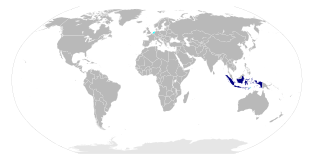
Indonesian is the official and national language of Indonesia. It is a standardized variety of Malay, an Austronesian language that has been used as a lingua franca in the multilingual Indonesian archipelago for centuries. Indonesia is the fourth most populous nation in the world, with over 279 million inhabitants of which the majority speak Indonesian, which makes it one of the most widely spoken languages in the world. Indonesian vocabulary has been influenced by various languages, including Javanese, Minangkabau, Buginese, Banjarese, Arabic, Dutch, and English. Many borrowed words have been adapted to fit the phonetic and grammatical rules of Indonesian.

Halal is an Arabic word that translates to 'permissible' in English. In the Quran, the term halal is contrasted with the term haram. This binary opposition was elaborated into a more complex classification known as "the five decisions": mandatory, recommended, neutral, reprehensible and forbidden. Islamic jurists disagree on whether the term halal covers the first two or the first four of these categories. In recent times, Islamic movements seeking to mobilize the masses and authors writing for a popular audience have emphasized the simpler distinction of halal and haram.

Malaysian Malay, also known as Standard Malay, Bahasa Malaysia, or simply Malay, is a standardized form of the Malay language used in Malaysia and also used in Brunei and Singapore. Malaysian Malay is standardized from the Johore-Riau dialect of Malay. It is spoken by much of the Malaysian population, although most learn a vernacular form of Malay or another native language first. Malay is a compulsory subject in primary and secondary schools.

Indonesian slang vernacular, or Jakarta colloquial speech is a term that subsumes various urban vernacular and non-standard styles of expression used throughout Indonesia that are not necessarily mutually intelligible. Regional slang from the capital of Jakarta, based on Betawi language, is however heavily exposed and promoted in national media, and considered the de facto Indonesian slang. Despite its direct origins, Indonesian slang often differs quite significantly in both vocabulary and grammatical structure from the most standard form of Indonesia's national language. These expressions are neither standardized nor taught in any formal establishments, but rather function in daily discourse, usually in informal settings. Several dictionaries of bahasa gaul has been published. Indonesian speakers regularly mix several regional slangs in their conversations regardless of origin, but depending on the audience and the familiarity level with the listeners.

Surya Citra Televisi (SCTV) is an Indonesian free-to-air television network. It was launched on 24 August 1990 in Surabaya, East Java as Surabaya Centra Televisi, broadcasting to the city and its surrounding area. At first, the programming was similar to that of RCTI, broadcasting foreign shows and some of RCTI news programs until they could produce their own. On 30 January 1993, SCTV obtained a national license and eventually moved its operations to Jakarta marks the end of 3 years affiliations with RCTI from Jakarta, changing its name to Surya Citra Televisi. Its main offices are located in Central Jakarta, with studios in West Jakarta. It is owned by Surya Citra Media, a publicly listed subsidiary of the technology company Emtek.

Sukan RTM is a Malaysian sports channel owned and operated by Radio Televisyen Malaysia which airs local and international sports programming, with some of its programs produced and licensed by its sports division.
The Pasundan Christian Church was officially established in Indonesia on 14 November 1934. It has 51 congregations and 33,000 members. It is a member of the World Communion of Reformed Churches (WCRC).

Muhammad Rizieq bin Hussein Shihab is an Indonesian Islamist cleric, the founder and leader of the Islamist group Islamic Defenders Front, which was banned by the government in December 2020. Facing criminal charges in Indonesia, he lived in Riyadh, Saudi Arabia from 2017 to November 2020. Following his return to Indonesia, he was arrested in late 2020, accused of criminal incitement for holding crowded events that violated the COVID-19 pandemic regulations.
LIPIA is a Saudi educational institution established in Jakarta, Indonesia. The college is a branch of the Imam Muhammad ibn Saud Islamic University in Riyadh, Saudi Arabia. The main purpose is to teach Arabic and Islam. The college has been accused of promoting a fundamentalist view of Islam, harbouring political Islamists and Salafists.

Muhammad Quraish Shihab is an Indonesian Arab-Bugis Muslim scholar in the sciences of the Qur'an, an author, an Academic Scholar, and former Minister of Religious Affairs in the Fourth Development Cabinet (1998). He is the older brother of the former Coordinating Minister for People's Welfare, Alwi Shihab.
The Piala Presiden is an annual pre-season association football tournament held in Indonesia and organized by the Football Association of Indonesia (PSSI). Liga 1 and Liga 2 clubs are entitled to participate. The inaugural tournament was held in 2015 to fill the vacuum of the Indonesia Super League when Indonesia was suspended by FIFA for government interference. The most recent tournament was held in 2022.

Abdul Somad Batubara is an Indonesian Islamic preacher, scholar and motivator from Asahan, North Sumatra. He is currently also serving as a lecturer at the Sultan Syarif Kasim II State Islamic University in Riau.

Adhisty Zara Sundari Kusumawardhani, known professionally as Adhisty Zara and formerly Zara JKT48, is an Indonesian singer, performer, and actress.

North Sumedang is a district in Sumedang Regency, West Java, Indonesia which serves as the regency seat of Sumedang Regency. It is located halfway along the provincial route connecting Bandung and Cirebon. The Cisumdawu Toll Road is planned to connect to the district in 2021, to ease travels and economic activities between Bandung, Sumedang and Kertajati International Airport.

Buda Script or (Aksara Buda) or Gunung Script is an archaic script. Based on its shape, the Buda Script still has a close relationship with the Kawi script. This script was previously used on the island of Java and Bali. This type of script is called the Buda script because it is considered to have originated from the pre-Islamic era which is called the Buddhist Age. The word Buda is based on the Buddha word. Manuscripts containing writing using the Buda script are commonly found in mountainous areas. Because of that, this type of script is also called the "Mountain script".
2022 (MMXXII) was a common year starting on Saturday of the Gregorian calendar, the 2022nd year of the Common Era (CE) and Anno Domini (AD) designations, the 22nd year of the 3rd millennium and the 21st century, and the 3rd year of the 2020s decade.

A village-owned enterprise, often shortened to BUMDes or BUM Desa, is a type of company that is managed and established by an Indonesian village. These companies span a wide array of industries, from agriculture and mining to tourism and retail. BUMDes are a relatively recent development in Indonesia, first appearing in the aftermath of fall of Suharto and the rapid decentralization that followed. As of 2022, according to data from the Ministry of Villages, Development of Disadvantaged Regions, and Transmigration, there are total of 74,691 registered BUMDes. However, due to bureaucratic difficulties, only around 10 percent (7,902) are certified as legal entities as of 2022.

This bibliography of Abul Hasan Ali Hasani Nadwi is a selected list of generally available scholarly resources related to Abul Hasan Ali Hasani Nadwi, a leading Islamic scholar, philosopher, writer, preacher, reformer and a Muslim public intellectual of 20th century India, the author of numerous books on history, biography, contemporary Islam and the Muslim community in India. He wrote a 7 volume autobiography in Urdu titled Karwan-e-Zindagi in 1983–1999. In this work, he tried to cover all the information related to himself as well as the remarkable events of his life. This list will include his biographies, theses written on him and articles published about him in various journals, newspapers, encyclopedias, seminars, websites etc. in APA style.














